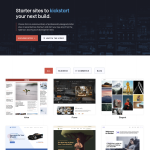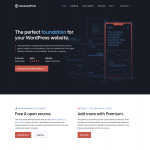If you’re interested in creating a website, you may have heard of WordPress. WordPress is a popular content management system that allows you to create and manage websites without needing to know how to code. However, you may be wondering if you need to know HTML and CSS to use WordPress effectively.
The short answer is no, you do not need to know HTML and CSS to use WordPress. WordPress has a user-friendly interface that allows you to create and manage content easily without any coding knowledge. However, knowing HTML and CSS can be helpful if you want to customize your website beyond the options provided by WordPress themes and plugins.
Understanding WordPress
What is WordPress?
WordPress is a popular content management system (CMS) used to create and manage websites. It is an open-source platform, which means it is free to use, and developers can modify and customize it to fit their needs. WordPress is built on PHP and uses a database to store website content.
How does WordPress work?
WordPress allows users to create and manage website content through a user-friendly interface. Users can create posts, pages, and custom post types, and add media such as images and videos to their website. WordPress uses themes to control the design and layout of a website, and plugins to add functionality such as contact forms, social media integration, and e-commerce features.
Why use WordPress?
WordPress is a popular choice for web development because it is easy to use, flexible, and customizable. It has a large community of developers who create themes and plugins, which means there are many options available to customize a website. Additionally, WordPress is a dynamic CMS, which means it can be used for a variety of websites, from blogs to e-commerce sites.
WordPress vs Static HTML
When building a website, developers can choose between using WordPress or building a static HTML site. While static HTML sites can be faster and more secure, they are also more difficult to update and manage. WordPress, on the other hand, allows users to easily add and update content, without needing to know HTML or CSS.
Overall, WordPress is a powerful CMS that can be used to create a variety of websites. It is flexible, customizable, and easy to use, making it a popular choice for web development.
HTML and CSS Basics
What is HTML?
HTML (Hypertext Markup Language) is the standard language used to create web pages. It is a markup language that defines the structure and content of a web page using a series of HTML elements. HTML elements are represented by tags, which are enclosed in angled brackets, and they define the structure and content of a web page.
What is CSS?
CSS (Cascading Style Sheets) is a stylesheet language used to describe the presentation of a web page written in HTML. It is used to style HTML elements using a set of rules that define how the elements should be displayed on the screen, such as color, fonts, spacing, and layout.
Why learn HTML and CSS?
Learning HTML and CSS is essential for anyone who wants to create a website or work in web development. HTML and CSS form the foundation of web development, and they are essential for creating responsive, accessible, and visually appealing websites.
HTML and CSS for WordPress
While it is possible to create a WordPress website without any coding knowledge, having a basic understanding of HTML and CSS can be beneficial. WordPress is built using HTML and CSS, and having a working knowledge of these languages can help users customize their website and troubleshoot any issues that arise.
In WordPress, HTML is used to structure the content of a web page, while CSS is used to style the content. Users can add custom HTML and CSS to their WordPress website using the WordPress editor or by creating a child theme.
Overall, having a basic understanding of HTML and CSS can be beneficial for anyone working with WordPress, as it can help users customize their website and create a more visually appealing and functional site.
WordPress Themes and Plugins
WordPress Themes and Plugins are essential components of WordPress that enable users to customize and enhance their websites. In this section, we will discuss what WordPress Themes and Plugins are, how they work, and how you can customize them to suit your needs.
What are WordPress Themes?
WordPress Themes are pre-designed templates that determine the appearance and functionality of your website. They include the layout, color scheme, typography, and other design elements that make up the visual aspect of your site. There are thousands of free and premium WordPress Themes available, and you can switch between them at any time.
What are WordPress Plugins?
WordPress Plugins are software components that add specific features or functionalities to your website. They can be used to extend the functionality of your site, improve its performance, or enhance its security. There are thousands of free and premium WordPress Plugins available, and you can install and activate them with just a few clicks.
Customizing WordPress Themes
Customizing WordPress Themes is a great way to make your website unique and stand out from the crowd. You can customize your WordPress Theme by changing its colors, fonts, layout, and other design elements. You can also add custom CSS or JavaScript code to further customize your site’s appearance and behavior.
Child Themes
Child Themes are a type of WordPress Theme that inherits the functionality and design of a parent Theme. They allow you to make changes to your site’s appearance and functionality without modifying the parent Theme directly. This makes it easier to update the parent Theme without losing your customizations.
Premium Themes
Premium Themes are professionally designed WordPress Themes that offer more advanced features and functionalities than free Themes. They are usually sold by third-party developers and come with a price tag. Premium Themes often include premium support and documentation, making them a great choice for users who want a more polished and professional-looking website.
Compatibility Issues
Compatibility Issues can arise when using WordPress Themes and Plugins from different sources. For example, a Plugin may not work with a specific Theme, or a Theme may not be compatible with a particular Plugin. To avoid compatibility issues, it’s essential to choose Themes and Plugins that are designed to work together. You can also check user reviews and ratings to ensure that the Theme or Plugin you choose is reliable and compatible with your site.
In summary, WordPress Themes and Plugins are essential components of WordPress that allow users to customize and enhance their websites. With thousands of free and premium options available, you can choose the Theme and Plugins that best suit your needs and make your website unique and professional-looking.
WordPress Development
If you’re interested in WordPress development, you may be wondering what skills you need to have. While HTML and CSS knowledge can be helpful, they are not necessary to get started with WordPress development.
What is PHP?
PHP is a server-side scripting language that is used to create dynamic websites. It is the backbone of WordPress development, as the WordPress core is written in PHP. Therefore, having a basic understanding of PHP is essential for WordPress development.
WordPress Coding Basics
To get started with WordPress development, you’ll need to understand the basics of how WordPress works. This includes understanding the WordPress file structure, how to create and modify themes, and how to create and modify plugins. WordPress uses a combination of PHP, HTML, CSS, and JavaScript, so having a basic understanding of these languages is helpful.
WordPress Developer Tools
There are many tools available for WordPress developers that can make development easier and more efficient. These include code editors, debugging tools, and version control systems. Some popular code editors for WordPress development include Visual Studio Code, Sublime Text, and Atom.
WordPress Hosting
When it comes to WordPress development, choosing the right hosting provider is important. Look for a hosting provider that specializes in WordPress hosting, as they will have servers optimized for WordPress performance. Some popular WordPress hosting providers include Bluehost, SiteGround, and WP Engine.
WordPress Updates
WordPress is constantly being updated with new features and security fixes. As a WordPress developer, it’s important to stay up-to-date with the latest WordPress updates and security patches. This will ensure that your WordPress sites are secure and up-to-date.
In conclusion, while HTML and CSS knowledge can be helpful for WordPress development, they are not necessary. Instead, focus on learning the basics of PHP, understanding the WordPress file structure, and using the right developer tools. With these skills, you’ll be well on your way to becoming a successful WordPress developer.
Advanced WordPress Customization
If you want to take your WordPress website to the next level, you may need to learn some advanced customization techniques. In this section, we’ll cover some of the most important aspects of advanced WordPress customization, including custom CSS, additional CSS, JavaScript for WordPress, and troubleshooting WordPress CSS.
Custom CSS
Custom CSS is a powerful tool that allows you to customize the look and feel of your WordPress website. With custom CSS, you can change the font, color, size, and layout of your website. You can also add custom styles to individual pages or posts.
To add custom CSS to your WordPress website, you can use the built-in Customizer tool. Simply go to Appearance > Customize > Additional CSS, and you’ll be able to add your custom CSS code.
Additional CSS
Additional CSS is another way to add custom styles to your WordPress website. With Additional CSS, you can add custom CSS code to your website without having to modify any theme files.
To access Additional CSS, go to Appearance > Customize > Additional CSS. Here, you can add your custom CSS code and preview the changes in real-time.
JavaScript for WordPress
JavaScript is a powerful programming language that can be used to add dynamic functionality to your WordPress website. With JavaScript, you can create interactive forms, animations, and more.
To add JavaScript to your WordPress website, you can use the built-in Customizer tool. Simply go to Appearance > Customize > Additional CSS, and you’ll be able to add your JavaScript code.
Troubleshooting WordPress CSS
If you’re having issues with your WordPress website’s CSS, there are a few things you can try to troubleshoot the problem. First, make sure that you’re using valid CSS code. You can use online tools like the W3C CSS Validator to check your code for errors.
If your CSS code is valid and you’re still having issues, try disabling any plugins that may be causing conflicts with your CSS. You can also try switching to a different theme to see if the issue persists.
In conclusion, custom CSS, additional CSS, JavaScript for WordPress, and troubleshooting WordPress CSS are all important aspects of advanced WordPress customization. By learning these techniques, you can take your WordPress website to the next level and create a truly unique and customized online presence.
WordPress SEO and E-commerce
When it comes to running an e-commerce website on WordPress, there are a few things to keep in mind to ensure that your website is optimized for search engines and user experience. In this section, we will discuss some of the essential aspects of WordPress SEO and e-commerce, including Yoast SEO, WooCommerce, WordPress hosting providers, and custom domains.
Yoast SEO
Yoast SEO is a popular WordPress plugin that helps you optimize your website for search engines. It provides you with a range of features, including XML sitemaps, meta tags, and social media integration, to help you improve your website’s search engine rankings. With Yoast SEO, you can also analyze your content’s readability, keyword usage, and more, to ensure that your website is optimized for both search engines and users.
WooCommerce
WooCommerce is a popular e-commerce plugin for WordPress that allows you to sell products and services directly from your website. It provides you with a range of features, including product pages, shopping carts, and payment gateways, to help you create an online store that is both user-friendly and secure. With WooCommerce, you can also manage your inventory, track your sales, and more, to help you run your e-commerce business more efficiently.
WordPress Hosting Providers
Choosing the right WordPress hosting provider is essential for ensuring that your website is fast, secure, and reliable. There are many WordPress hosting providers available, each with its own set of features and benefits. Some of the popular WordPress hosting providers include Bluehost, SiteGround, and WP Engine. When choosing a WordPress hosting provider, it’s essential to consider factors such as uptime, speed, security, and customer support.
Custom Domain
Having a custom domain is essential for creating a professional and trustworthy online presence. A custom domain allows you to create a unique web address that reflects your brand and makes it easier for people to find your website. When choosing a custom domain, it’s essential to consider factors such as domain availability, domain extensions, and domain registrars.
In conclusion, optimizing your WordPress website for SEO and e-commerce is essential for creating a successful online business. By using plugins such as Yoast SEO and WooCommerce, choosing the right hosting provider, and having a custom domain, you can create a website that is both user-friendly and optimized for search engines.
Conclusion
In conclusion, while it is not necessary to know HTML and CSS to use WordPress, it can be beneficial for those looking to enhance their website design skills.
For beginners, WordPress offers a user-friendly visual editor and Gutenberg editor that allows for easy customization without any coding knowledge. Additionally, site builders like Elementor and Divi provide drag and drop interfaces that make website creation even more beginner-friendly.
However, learning HTML and CSS can provide greater flexibility and control in website design. Knowing selectors, syntax, and values can allow for more precise styling and customization in the theme customizer. For web designers and developers, knowledge of HTML and CSS is essential for creating static HTML pages and developing custom themes.
While WordPress has made it possible to create a website without any coding knowledge, it is important to note that learning HTML and CSS can only enhance one’s understanding and abilities in website design. Kinsta also suggests that learning these skills can help in troubleshooting website issues and optimizing site speed.
Overall, the decision to learn HTML and CSS ultimately depends on the individual’s goals and needs. For those looking to create a simple website, WordPress provides ample tools and resources. However, for those looking to take their website design to the next level, learning HTML and CSS can provide greater flexibility and control.






